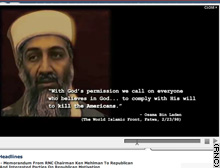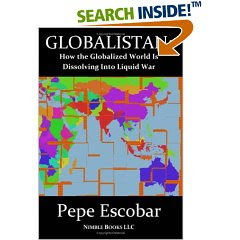Only fools and
idiots believed, and still believe, that the Bush administration marched into Iraq for "humanitarian" reasons. Villians and critics knew better.
Of course, it started out as a hue and cry about WMD, but when that fell flat, the rosy rhetoric of "freedom" came spilling out. Indeed, for all his eloquence, Christopher Hitchens firmly camped himself with the former group, too blinded by his own deep resentment of "Islamofascism," via the threats against his friend Salman Rushdie, to see what was so obvious. Hitchens even found himself wondering, with no sense of irony, why the Bush administration had
ignored the horrifying humanitarian crisis in Darfur while still insisting that the invasion of Iraq was the proper course and that it was being pursued for altruistic reasons and not the fact that Iraq sits at the center of the oil pot of the world.
The villians were headed up by Dick Cheney when he famously held conference with Big Oil during his Energy Task Force meetings of 2001, a meeting wherein senior executives of the major oil companies and the White House
poured over a map of Iraq. Critics knew what the villians were up to, which is primarily why they shoveled out the criticism. Of course, since Cheney successfully prevented this country from discovering what his Energy Task Force had been up to, no one really
knew.
All that is changing, but not because there has been any evidence coming out of Task Force documents. No, the evidence that is now appearing is what is developing in Iraq and Big Oil's expected neocolonial seizure of Iraq's current and potentially huge future oil reserves. Josh Holland delivers a fine piece on
the coming Oil Law the Iraqi government is currently working on.
Iraq is sitting on a mother lode of some of the lightest, sweetest, most profitable crude oil on earth, and the rules that will determine who will control it and on what terms are about to be set.
The Iraqi government faces a December deadline, imposed by the world's wealthiest countries, to complete its final Oil Law. Industry analysts expect that the result will be a radical departure from the laws governing the country's oil-rich neighbors, giving foreign multinationals a much higher rate of return than with other major oil producers, and locking in their control over what George Bush called Iraq's "patrimony" for decades, regardless of what kind of policies future elected governments might want to pursue.
Iraq's energy reserves are an incredibly rich prize; according to the US Department of Energy, "Iraq contains 112 billion barrels of proven oil reserves, the second largest in the world (behind Saudi Arabia) along with roughly 220 billion barrels of probable and possible resources. Iraq's true potential may be far greater than this, however, as the country is relatively unexplored due to years of war and sanctions." For perspective, the Saudis have 260 billion barrels of proven reserves.
Iraqi oil is close to the surface and easy to extract, making it all the more profitable. James Paul, Executive Director of the Global Policy Forum, points out that oil companies "can produce a barrel of Iraqi oil for less than $1.50 and possibly as little as $1, including all exploration, oilfield development and production costs." Contrast that with other areas where oil is considered cheap to produce at $5 per barrel, or the North Sea where production costs are $12-16 per barrel.
In fact, the Oil Law will probably introduce what are known as Production Service Agreements (PSAs) that lock in access to cheap oil for decades. These agreements are constitutionally prohibited by many of Iraq's neighbours. But in Iraq's Constitution, a document more or less written in Washington, the Iraqi government is required to "develop oil and gas wealth" and further mandates that a major stake of Iraqi oil goes to multinational corporations, which include the big four, Exxon-Mobile, Chevron-Texaco, British BP-Amoco and Royal Dutch-Shell.
But all this movement by the oil oligarchy is predicated on a failing assumption and that is that Iraq will actually exist and will be stable enough for the mulitnationals to operate in the region. Today, that assumption is looking wobbly, at best. With Kurdistan now a de facto autonomous state and Shiites and Sunnis conducting
ever more deadly sectarian attacks -- government-backed militias are actually conducting some of the brutal raids on Sunni populations -- the Sunnis are now declaiming that the "sectarian government" must be stopped. In fact, Sunni Arabs have declared a
new Islamic republic in the western part of the country, right where the oil companies believe is that vast amount of as yet untapped sweet crude. How the oil companies plan to operate in this theatre of war is a guess best left to them. Given this government's previous record on predicting the future in Iraq, it would appear that their best guesses will be fairly well off the mark.
My suspicion is that they
don't know how to operate in such conditions, if they can at all. This probably wasn't a scenario imagined by the Energy Task Force, which was then imagining rose pedal showers while they drilled into the easy money oil fields of western Iraq. Given the extant conditions in Iraq now, I would dispute Holland's declarative headline that the oil company cartel "almost has Iraq's oil." Actually, they're not even close. But that has nothing to do with the PSAs and the phoney Iraq Constitution. It has everything to do with the reality on the ground. No one knows, at this point, whether there will be any place still left that will continue to be called Iraq.
Chris Floyd posed
an excellent argument awhile back that the entire PNAC neocon philosophy was nothing but an idealogical window dressing for more of the same rapacious economic brinkmanship that American corporations, aided and abetted as always by their government toadies, have been practicing for decades. Too many people, Floyd claimed, were blaming the neocons for what was essentially age-old economic imperialism, with US military backing provided by the Bush administration's oily whores. Admittedly, the Iraq adventure is an order of magnitude or more grander than anything that has been attempted to date, but the basic mechanisms and familiar justifications were all there. Given what we are now seeing transpire, vis a vis the multinational oil companies and the succulent new oil wealth, oh, so tantalizingly close, it is hard to argue against Floyd's view.
Nonetheless, the harsh and volatile reality in Iraq is likely to damp the wet dreams of the oil executives. Despite the White House's firm belief that they create their own reality, the oil companies are a little more pragmatic when it comes to actual reality. And they must know at this point that their dreams and plans for Iraq's untapped oil riches may remain just that for a very long time.
Which is what happens when you make plans with people who have no understanding of the world of people and ignore and dismiss those who would tell you that things would be much more difficult than having rose pedals tossed from the hands a welcoming population of Muslims in the Middle East, a Middle East that you have been screwing with for decades.
























